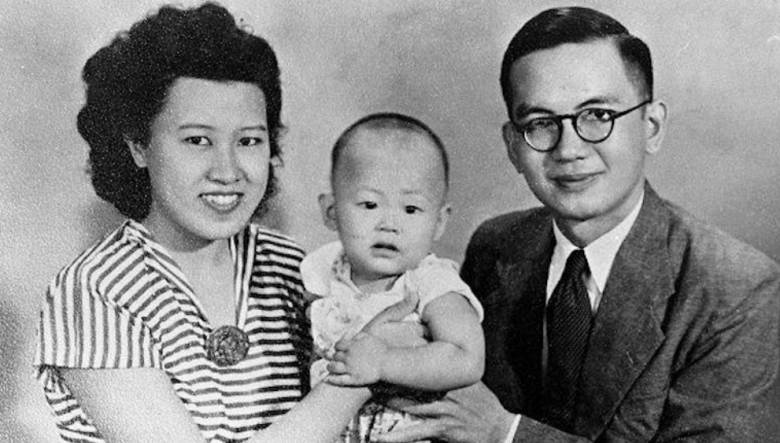Petrus Kanisius Ojong, One of Kompas Daily Founder

Without PK Ojong exploring the business aspect of Kompas Daily, with its parent company Kompas-Gramedia might not be big without the hard work and simplicity of PK Ojong. Written by Pepih Nugraha of Pepnews.com, Founder of Kompasiana.com, Retired Journalist of Kompas Daily.
Petrus Kanisius Ojong or Auw Jong Peng Koen is the founder of Kompas Daily along with Jakob Oetama. These two media "legends" are often called "Dwi Tunggal" with a complementary composition; editorial staff and business. PK Ojong died in 1980 when he was 59 years old.
Ojong, because of his entrepreneurial background, pays close attention to the media business side so that he is able to build a media corporation with the name Kompas-Gramedia (KG), while Jakob is more concerned with editorialism. KG to become big as it is today cannot be separated from its role, at the same time Kompas Daily has become the largest newspaper in Indonesia until now.
I was not one of his employees at the time before he passed away at Kompas Daily because I started working in Kompas Daily in 1990 or 10 years after Ojong died, but I heard many stories of the kindness from the man who was born in Bukittinggi, West Sumatra in 1920.
He is remembered by his junior colleagues that I know, even to OB (Helpers), who has worked for a long time, as a simple figure. Even simple to measure his success as an entrepreneur. Simple is shown in attitude, even in clothes or tools of work.
Helen Ishwara in the biographical book PK Ojong Hidup Sederhana, Berpikir Mulia (Living Simple, Think Noble), describes the simplicity of PK Ojong through Siswadi's narrative, that the typewriter used as a working tool was "janggy" typewriter compared to the typewriter in the initial office of the Kompas Daily Editor. I read the book published by the PBK (Penerbit Buku Kompas) in 2001 so that it helped give an understanding of PK Ojong.
In the same book I have read and remembered, Helen described the simplicity of PK Ojong through a belt he was wearing that could last years and still wrapped around his waist. Of course it's not that PK Ojong can't buy a new belt, but he believes that the existing one can still be used, why should it be replaced?
In Kompas Daily, PK Ojong maintains the Kompasiana section, a section that he created and wrote himself, containing factual, not fictional, sketches of people's lives. His writing style is very personal, so it is similar to a blogger's style in writing on a personal blog.
That's why the social blog that I founded in 2008 with my friends took the name of PK Ojong's Kompasiana section. This name represents a straightforward, with straightforward writing style, capturing trivial matters that have escaped the observations of other journalists who are "stuck" in routine.
PK Ojong pays attention to the history of major wars that have occurred, as well as the figures involved in that war. Some of them have been in a book and have been reprinted.
In developing Kompas management, PK Ojong's remnants of goodness are still felt, where the principle was to prioritize the welfare and survival of its employees rather than giving a large salary that is gross every month. Elements of bonuses, gratuities, and twice a year bonus (Eid and Christmas), but it has been preserved until now and is a legacy of PK Ojong.
Even at the beginning of my work in the 1990s, every employee even to OB (Helpers), received a share of dozens of media published by KG such as Kompas Daily, Tabloid Monitor, Bola, Hai Magazine, Intisari Magazine, Donald Bebek Magazine, and others. Every employee who has worked for seven years is entitled to a land / house purchase loan and for certain positions a motorized vehicle installment are all provided.
However, because there have been management reforms since 2000 and reform, one of which means cutting, has eliminated the ration of newspapers and magazines for employees. What remains is only the Kompas Daily, which was then abolished after entering the digital era in 2016. Every employee is given access to read Kompas in digital format for free.
It's the big things he thinks about. However, PK Ojong also thought about trivial things such as the ration of two domestic chicken eggs that were given to employees who worked night to morning. I usually collect the two chicken eggs, wrap them in transparent plastic and put them on the table by the OB (Helpers). I sometimes bring the eggs to the Indomie (Instant Noodle) cooker at night to boil them.
If you are on duty on a Saturday night, then fresh hot milk is provided which can arouse your work passion, at least get rid of fatigue and refresh your mind. Weekend night overtime pay is greater than regular night overtime pay. Some of the employees recalled that even in the early days umbrellas and raincoats were provided.
Of course, the policy on employee welfare was the result of a joint decision made by Jakob Oetama, which was continued by his "soulmate". However, this image of simplicity stuck with Ojong.
In a number of literatures it is stated that PK Ojong is so tough and uncompromising in matters of news. When Kompas was banned in 1978 by the New Order regime led by President Soeharto, for example, PK Ojong insisted not to give up against the rulers by not signing a statement issued by the government.
However, Jakob has a different attitude with his senior. He sees the other side of the number of people who have depended on the survival of Kompas itself. Jakob then signed the declaration.
But later on, it was proven that what "junior" Ojong, in this case Jakob, was doing was the right move. Because it is useless to struggle to improve the nation, but the media is muzzled, as happened in the Indonesia Raya Daily led by Mochtar Lubis.
Indeed, Mochtar Lubis and his Indonesia Raya are remembered for his bravery and heroic attitude, but the newspaper never appeared again so that it did not play any role in educating the nation's life. Jakob saw the other side rather than simply obtaining a heroic stamp but only being remembered for a while or simply being recorded in history by compromising the will of the ruler at that time.
However, without PK Ojong exploring the business side of the media, Kompas Daily with its parent company Kompas-Gramedia might not be as big as it is today without the hard work and simplicity of a PK Ojong.
***



